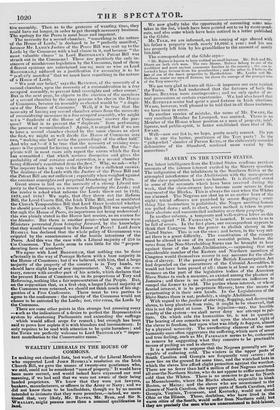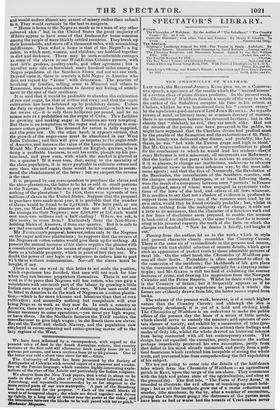SLAVERY IN THE UNITED STATES.
THE latest intelligence from the United States confirms previous accounts of the intense interest excited by the Slavery question. The indignation of the inhabitants in the Southern States at the attempted interference of the Abolitionists with the management of the slave population. knows no bounds. It is distinctly stated in some of the accounts which have been received (luring the week, that the slave-owners have become more severe in their treatment of the Blacks. This is always the case when the Whites
are alarmed. The Negroes are shut up at au earlier hour of the night; trivial offences are punished by severe flogging ; every thing, like instruction is prohibited; the Negro meeting-houses are pulled down ; and, in short, every method is taken to prove their absolute and uncontrolled authority over their property. In another column, a temperate and well-written letter on this subject, signed " H. FAIRHAIRN,," is inserted. It seems to us to be full of errors. In the first place, our correspondent appears to think that Congress has the power to abolish slavery in the United States. This is not the case ; and hence, in the very out- set there is a great difficulty. The constitution of the country must be altered in one of its most essential points, before the votes from the Non-Slaveholding States can be brought to bear against those of the Anti-Abolitionists,— supposing that any considerable number of the Eastern and Northern members of Congress would themselves concur in any measure for the aboli- tion of slavery. If the passing of the British Emancipation Act had depended on the concurrence of the Colonial Assemblies, it would not have been passed at all : there is at least as much re- luctance on the part of the legislative bodies of the American Slave States to such a measure, as existed among the planters of Jamaica ; and there is no all-powerful extranems influence to compel the former to yield. The parties whose interest, or whose fancied interest, it is to perpetuate Slavery, have the means of perpetuating it in their own hands. In the Legislatures of the Slave States there is not, probably, a single Abolitionist. With regard to the justice of starving, flogging, and destroying slaves, to keep planters from ruin, it ought to be observed, that this is not the point at issue. The injustice—nay, the horrible cruelty of the system—we shall never deny nor attempt to pal- liate. On which side the humanities lie, is not in question. The bearing of our remarks was not upon the abstract right of the slaves to freedom, but upon what was likely to happen, almost by a physical necessity. The unreflecting clamour of the mere humanity-men often aggravates the suffering, which men of sense and true feeling, such as Mr. FAIRBAIRN seems to be, endeavour to remove by suggesting what they conceive to be practicable means of putting an end to slavery.
It is a mistake to suppose that the Negroes generally are in- capable of enduring cold. The winters in the upper parts of South Carolina and Georgia are frequently very severe: the snow lies on the ground for some time, and the wretched huts in which the slaves live afford slight protection against the weather. There are no fewer than half a million of free Negroes scattered all over the Northern States, who do not appear to suffer more from cold than the Whites. There is no occasion to go so far North as Massachusetts, where the Blacks abound, especially in bleak Boston, or Maine; and the slaves who are accustomed to the climate of North Carolina, the upper parts of South Carolina, and Georgia, Virginia, Tennessee, and Kentucky, would not dread i Ohio or the Illinois. Those, doubtless, who have lived in the
warm cities of the South, would suffer from Northern cold; but they are precisely the men who are unaccustomed to geld-labour,
and would endure almost any extent of misery rather than submit to it. They would certainly be the last to emigrate.
" Home is home to the Negro as much as to a man of any other coloured skin :" but in the United States the great majority of Whites appear to have none of that fondness for home common among the people of more thickly-settled countries. They break up their households, and move off a thousand miles, with astonishing indifference. Then what a home is that of the Negro!—a log cabin, in which men, women, and children, are huddled together in dirt and darkness. There may be such comfortable cottages as some of the slaves in our West Ir.dian Colonies possess, with neat little gardens, poultry-yards, and other agremens ; but a traveller may ride on horseback many hundred miles among the Negro population of the Southern States and not see one such. Depend upon it, there is scarcely a field Negro in America who does not regard his " home" with detestation. The practice of breaking up families, selling some to Missouri and others to Tennessee, must also contribute to destroy any feeling of attach- ment to the spot of their residence.
It is said that it would be profitable to abandon the cultivation of rice and sugar, for that of cotton and corn ; and that the sugar cultivation has been bolstered up by prohibitory duties. Unless the duty on sugar has been recently augmented,—which we are not aware of,—it is only three halfpence per pound, and by no means acts as a prohibition on the sugar of Cuba. Th e facilities for growing and making sugar in Louisiana are very tempting. But there is no temptation to the sugar and rice planter to com- mence cotton-grower. The demand for cotton is fully supplied, and the price low. On the other hand, it appears certain, that the growth of the sugar-cane must be abandoned in our West India Colonies; and this will give an impetus to the sugar-trade of America, and increase the value of the Louisianian plantations. Would Mr. FAIRBAIRN recommend an English grazier, who is doing a profitable business, to sell his cattle, plough up his pas- ture-land, and grow corn, with which the market is glutted at 39s. a quartet? if it were true, that, owing to the mortality of the slave population, it is snore profitable to cultivate cotton and corn than rice and sugar, there would be no occasion to recom- mend the abandonment of the latter : but we suspect the reverse is the case.
It is proposed by our correspondent to purchase the slaves and the slave-plantations, the latter to be let or sold in small portions to the Negroes. And who is to pay for the slaves alone—to say nothing of the plantations ? In 1830, there were upwards of two millions of slaves in the United States. Suppose that the proposal to purchase were made next year, it is probable that the number of slaves would be found to be 2,500,000. We have paid, or are to pay, our West Indian planters at the rate of 251. a head on the average for their Negroes; now 2,500,000 at 251. each would cost sixty-two millions and a half sterling ! Where, we ask, is this money to come from ? Exclusively from the Non-Slave- holding States of America, if from any quarter. But it is safe to say that one-tenth of such a sum never would be raised. Mr FAIRBA1RN'S proposal, however, refers only to the Negroes on the sugar and rice plantations : he supposes that the owners of
the Negroes on cotton estates would give them up for nothing. At present the natural increase of his slaves supplies the planter with
a considerable portion of his means of support; and he looks upon them as a valuable property, which in point of fact they are. We doubt the power of any logic or eloquence to induce him to part wills them without remuneration. No—all the slaves must be bought, if any.
There is not one word in this letter to set aside the position, which experience has fortified, that men will not work for hire when they can become proprietors themselves. There is not one
word in it to prove that Negroes will hoe cotton, who can gain a subsistence with one-tenth part of the labour by growing a little
Indian corn on a virgin soil of their own. White men could not be hired in America to do the work of Negroes on a cotton planta. tion,—which is far more irksome and laborious than that of corn cultivation ; and assuredly nothing but compulsion will ever bring Negroes to work as they now do. In such a country as America, there are only two ways of obtaining the combination of labour necessary in some operations,—you must pay high wages, or have slaves. In the Northern factories the Tariff enables the manufacturer to give high wages ; in the South there are slaves. Reseal the Tariff and abolish Slavery, and the population now employed in cotton-spinning and cotton-growing moves off to the lazy regions of the West.



























 Previous page
Previous page